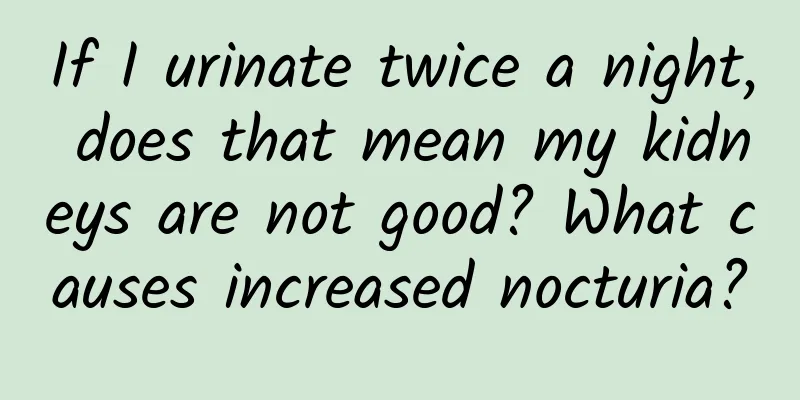If I urinate twice a night, does that mean my kidneys are not good? What causes increased nocturia?

|
A neighbor, Mr. Wang, who is over 60 years old, told Huazi nervously that his "kidneys" might be in trouble. He couldn't sleep well for a long time and had to get up 2-3 times every day. Mr. Wang said it might be because of his age. When he was young, he could pee 3 meters against the wind, but now he just hopes to keep his shoes dry when the wind blows. Huazi asked about Mr. Wang's symptoms. He said that he urinated more often, but the amount of urine was not much each time, and the urine was thin and weak, and he felt "unsatisfied" after urinating. Huazi comforted Mr. Wang that his symptoms did not seem to be caused by renal insufficiency, but probably a prostate problem. 1. What is considered nocturia? Uncle Wang told Huazi that he had read on his mobile phone that frequent urination at night was a sign of kidney problems. Was his current condition considered frequent urination at night? Huazi said that frequent urination at night should not only be determined by the frequency of urination, but also by the amount of urine. Generally speaking, the human body mainly urinates during the day, about 4 to 6 times, 300 to 500 ml each time. At night, the reabsorption function of the human renal tubules will be maximized, the urine will be concentrated, and usually urinate 0 to 1 time to avoid frequent urination at night that affects sleep. When kidney function declines, decreased renal tubular reabsorption is often the first symptom, manifested as decreased urine concentration and increased nocturnal urination. If you urinate more than twice at night, or the overnight urine volume exceeds 500ml, it means increased nocturia. Common causes of increased nocturia 1. Increased urination frequency: If the frequency of urination increases but the amount of urine is not large each time, it is likely not related to the kidneys, but to the urinary tract. For example, if the urinary tract is infected, it will cause urethritis and irritation, which will manifest as frequent urination, urgency, and stinging when urinating. Because women's urethra is straight and short, it is easy for bacteria to invade, making them a group prone to urinary tract infection. Frequent urination in middle-aged and elderly men is often caused by benign prostatic hyperplasia. Under the stimulation of androgens, the male prostate will continue to proliferate and become enlarged. The enlarged prostate will compress the urethra and cause difficulty in urination. Drugs can be used to control and inhibit the secretion of androgens and relax the urethral muscles to relieve symptoms. However, if the hyperplasia is severe, surgery is required to remove part of the prostate. Bladder diseases can also cause increased urination frequency, common ones include cystitis, stones, tumors, etc. 2. Increased total urination volume: If the urine volume increases and exceeds 500ml overnight, you should first check whether you drink too much water before going to bed or eat too much salt for dinner. Because the kidneys have a strong water and sodium regulation function, if the body takes in too much water and sodium, the secretion of antidiuretic hormone (ADH) will decrease, leading to increased urine volume. Increased urine volume at night is also the initial symptom of renal impairment. Long-term high blood pressure or diabetes, if not controlled to the standard, can easily cause renal damage. It is normal to go to the hospital for a urine routine test at this time, but the urine microprotein test may be excessive. Another reason for increased urine output at night is that patients with heart failure have poor circulation, so blood accumulates in the lower limbs when standing upright during the day. When lying flat to sleep at night, blood reflux increases, leading to increased urine output. Patients with heart failure may have edema during the day, and may experience chest tightness and difficulty breathing when lying flat. If diabetic patients do not control their blood sugar well, they will also have polyuria. And because blood sugar is too high, it will cause thirst, which will prompt people to drink more water and increase urine output. In summary, increased nocturia does not necessarily mean that there is something wrong with the kidneys. It is divided into increased urination frequency and increased total urination, and the common causes of the two situations are different. If you have symptoms of increased nocturia, don't be suspicious. Going to the hospital for a check-up as soon as possible is the best choice. I am pharmacist Huazi. Welcome to follow me and share more health knowledge. |
Recommend
When is beetroot harvested? Benefits of eating beets during pregnancy
Beetroot, which we call "red beetroot",...
Can pregnant women drink almond milk?
Almond milk is a very good drink. It contains the...
Can women eat donkey-hide gelatin during menstruation?
Many female friends like to eat Guyuan Paste beca...
Caesarean section anesthesia needle picture
With the improvement of China's medical techn...
Will the uterus shrink?
Uterine atrophy is actually very common in life. ...
Will I have my period in the first month of pregnancy?
Menstruation occurs every month when a woman is n...
Why do girls get hard pimples down there?
Many people have experienced this phenomenon in t...
Can I eat prawns during menstruation?
Menstruation is a very critical period for female...
What happens if you don't rest during a biochemical pregnancy?
What happens if an ectopic pregnancy is not treat...
Should folic acid tablets be swallowed or chewed
Folic acid tablets contain many elements that can...
Can I have sex after my period has ended?
There are many things to pay attention to when we...
What is the best dish to make with bitter melon? Tips for making sweet and sour bitter melon
Sweet and sour chrysanthemum is a dish. The main ...
Interesting Medicine Talk丨Azithromycin (with audio)
Your browser does not support the audio tag...
When are the sugar-heart apples picked? When are the sugar-heart apples in Aksu, Xinjiang available?
I would like to recommend an apple that is so swe...
This is something that women have to do no matter how shy they are.
Why do they give up? In addition to fear of pain,...









